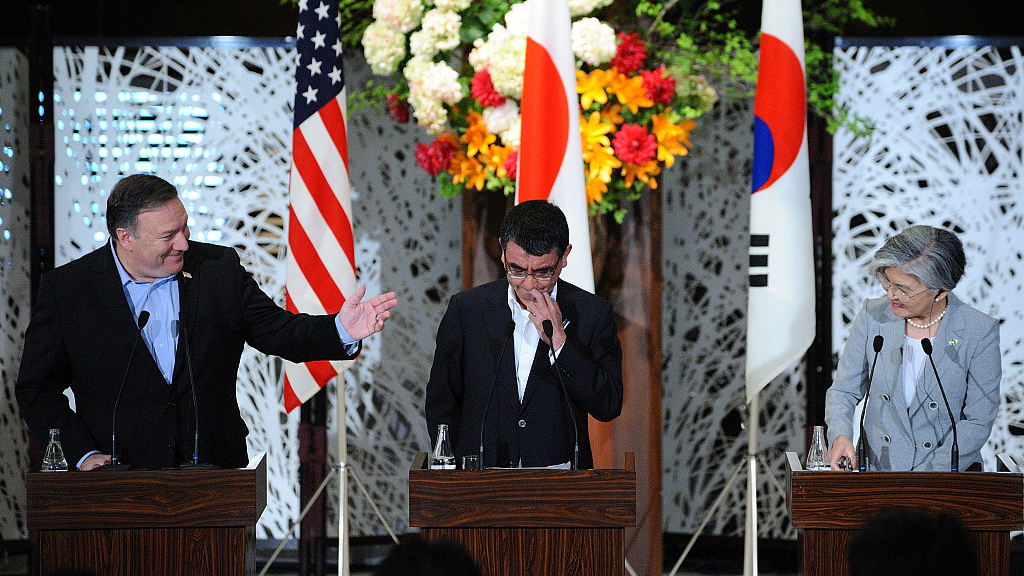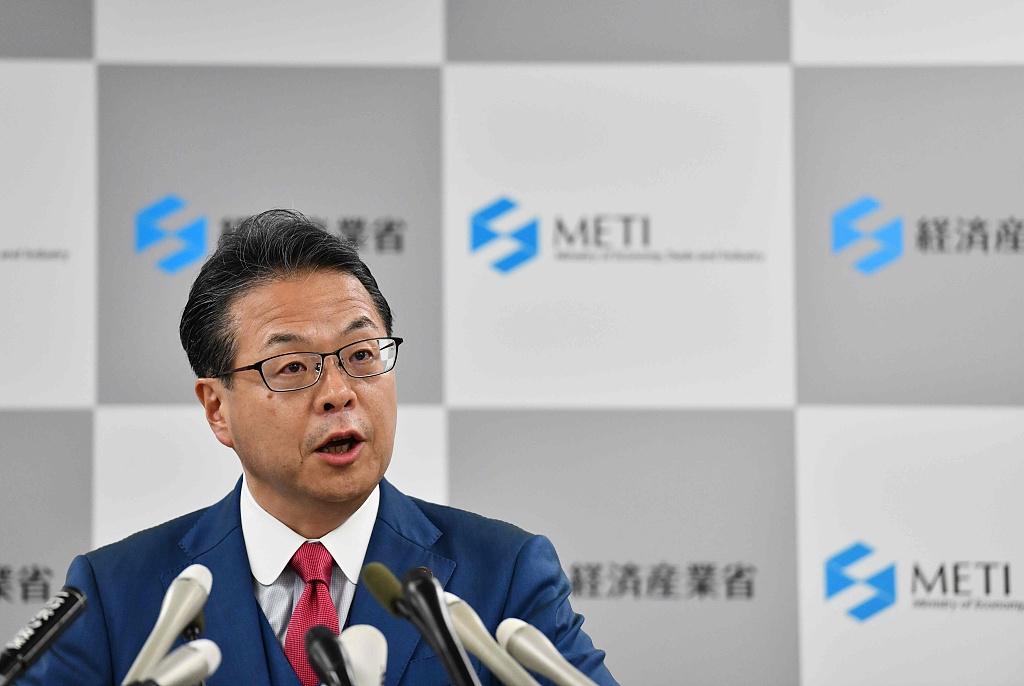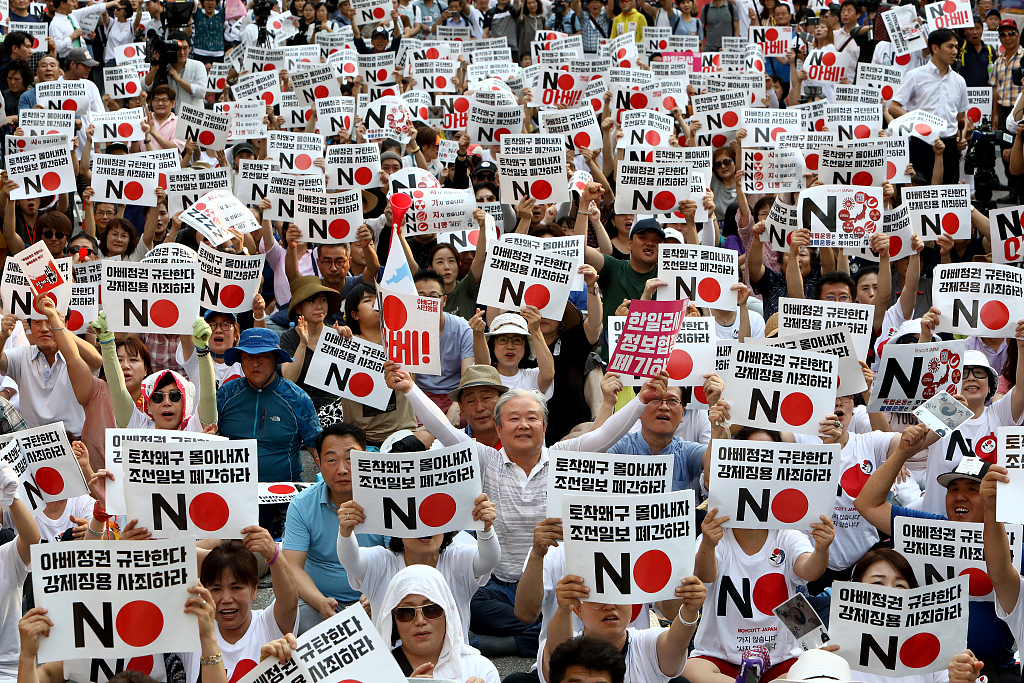

Editor's note: Tom Fowdy is a British political and international relations analyst and a graduate of Durham and Oxford universities. He writes on topics pertaining to China, the DPRK, Britain and the United States. The article reflects the author's opinion and not necessarily the views of CGTN.
On August 22, the Republic of Korea (ROK) announced that it would not renew an intelligence-sharing agreement it held with Japan, marking the latest escalation in a dispute that has embroiled the two countries over the past month, with both nations taking trade action against each other and Koreans engaging in a popular boycott of Japanese made products.
The termination of the agreement poses significant implications for coordination on the issue of the Democratic People's Republic of Korea (DPRK). It poses a security matter for the countries which were linked despite their differences, and in turn, weakens the overall strength and coordination of the U.S alliance system in Asia.
Inevitably, U.S.-centric commentators and analysts were dismayed at the move, hitting out at ROK President Moon Jae-in as a “leftist” who loves Pyongyang more than Tokyo and the proposed greater good of the American order. Such figures dreamed wholeheartedly of a “trilateral alliance system” whereby Tokyo and Seoul were utilized at Washington’s will for the broader strategic goal of “containing China” in Northeast Asia.
But that rhetoric ultimately tells us a lot about their mindset in the midst of this crisis; they have never been open to understanding or giving the ROK space on its own terms. In U.S. analysis, what is best for America is always best for Korea. For many, what deviates from Washington’s position is depicted as dangerous, morally wrong and self-defeating.

Japan's Economy, Trade and Industry Minister Hiroshige Seko answers a question during a press conference at the ministry in Tokyo, August 2, 2019. /VCG Photo
The country is thus assumed to be a “tool” that should automatically follow suit and align itself with American interests. Thus, disinterested and patronizing toward the broader history, the broader ambition that Seoul and Tokyo could be used in tandem was not only clueless, but always a non-starter. Today’s events thus all but ensure the trilateral dream is dead, but don’t expect the Blue House to be treated any differently.
We hear so much in American discourse about this so-called “Ironclad” alliance with ROK, but it is not a partnership that is rooted in equality, mutual respect or pragmatism, but rather a lopsided belief that the U.S. has a responsibility to determine what is in the best interests of Seoul and act as a “guardian” or “savior” to the country and “show it the correct way.” As a result, Americans idealize Seoul as a simple extension of their own interests and believe that ROK’s view of the world ought to be harmonious with the U.S. version.
For example, many commentators have bemoaned the growing tensions with Tokyo not because the fallout might hurt the two countries’ economies, but because it is assumed as U.S. allies their real duty is “to be against China.” Yet Washington’s projection ignores ROK’s decisions on its own perceptions that China is its neighbor and as its largest trading partner, economic stability is very important. On every foreign policy issue, Seoul’s own interests are effectively being “designated” from the U.S. perspective.
Given this, when Seoul strives to act on its own terms, which has included engagement with the DPRK and also dissatisfaction against Japan, this is viewed contemptuously. Prominent analyst Robert E. Kelly, enraged at the termination of the intelligence-sharing agreement with Japan, today noted: “Japan is a partner, DPRK is an opponent.”

ROK protesters participate in a rally to denounce Japan's new trade restrictions on ROK in front of the Japanese embassy in Seoul, South Korea, August 03, 2019. /VCG Photo
A whole load more commentators have criticized Moon for befriending the “enemy” and regularly accuse him of being susceptible of a communist-led conspiracy whereby Pyongyang will “subvert” the south. Rhetoric, such as Korean unification, the concept of one nation, and other dreams to reconcile with the DPRK are also treated with extreme contempt because America has already “decided” what Seoul’s true interest and perspective is, which apparently involves “saving ROK from itself.”
Given this somewhat condescending attitude, Americans have never tried to understand Seoul’s grievances against Tokyo and the legacy of occupation or take it seriously. Few analysts have expressed empathy or researched ways to help Japan address Korea’s historical grievances. Instead, they have simply viewed the whole saga as a mere nuisance and an unwanted distraction to “what really matters” and as noted above expected the country to get in line to the bigger picture of a “trilateral alliance” and work to contain China – as if nothing else ever mattered.
However, the events of August 22 finally hammered the nail into the coffin of that vision. The trilateral American dream is over, Seoul and Tokyo will never be allies. If the U.S. is to somehow formulate a vision of regional leadership, it must completely reevaluate its view of the ROK and stop treating the country in unequal, parental terms. However, don’t expect the current administration in Washington to treat the Blue House any differently.
(If you want to contribute and have specific expertise, please contact us at opinions@cgtn.com.)

Copyright © 2018 CGTN. Beijing ICP prepared NO.16065310-3
Copyright © 2018 CGTN. Beijing ICP prepared NO.16065310-3